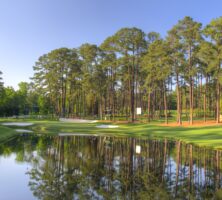Berckmans Nursery, also known as Fruitland, was the first large-scale horticultural nursery in the southeastern United States. Founded in 1858 in Augusta by Louis Mathieu Edouard Berckmans and his son Prosper Jules Alphonse Berckmans, the grounds later became the site of the Augusta National Golf Club.
Louis Berckmans, a trained physician, had a great interest in horticulture, which he passed along to Prosper, a university-trained horticulturist who received his education in France. Both were natives of Belgium and immigrated to the United States during the 1850s.

Courtesy of Georgia Archives.
The family operated Fruitland Nurseries from 1858 to 1918. During this period the Berckmans family introduced a great variety of plants, shrubs, and trees to the Southeast.
Prosper became famous for introducing new fruit varieties that were more suitable for growing in southern climates. He also developed or improved many types of peaches and eventually became known as the “Father of Peach Culture” across the South. Among his varieties were the South Chinese, or Honey, peach and the Chinese Cling. From the Chinese Cling, Prosper eventually bred the Elberta, Belle, and Thurber peaches, which became Georgia’s primary commercial varieties. His Thurber peach was the leading variety until it was replaced by the Elberta peach, which was later improved by Samuel Rumph.
The Berckmans were also responsible for introducing many other varieties of fruits and ornamental plants to the South, including the Kelsey plum, the Japanese persimmon, the hardy lemon, the kumquat, the sand pear and its hybrids, and the Citrus trifoliata, or hardy Japanese lemon hedge, which is an important stock for orange growing. In addition, the vast stock of azaleas and camellias at the Berckmans’ nurseries greatly contributed to the early and continued popularity of those flowers throughout the South.
Many varieties of trees and shrubs were grown at Fruitland. These included the Darlington oak, the Chinese pine, the Chinese holly, the holly-leaved tea olive, and the Spanish cork oak. In 1860 Prosper introduced the amur privet hedge (Ligustrum amurense) from France. Called the “Mother Hedge,” these original ten plants were the progenitors of all the privet hedges now found across the Southeast. Prosper also introduced such evergreens as the golden arborvitae (Thuja orientalis 'conspicua’) and dwarf golden arborvitae (Thuja orientalis 'nana’), both narrow-leaf evergreens used for formal garden planting.

Image from Brett Chisum
Today the Augusta National Golf Club, home of the Masters Tournament, occupies the former property of Fruitland Nurseries. In 1931, when golf champion Bobby Jones and his business partners created the club and golf course, two sons of Prosper Berckmans, Prosper J. A. Berckmans Jr. and Louis A. Berckmans, assisted in the landscape design of the course. In addition, the Berckmans’ home, Fruitland Manor, became the Augusta National Clubhouse. Many of the plant varieties developed and improved by the Berckmans family still grow at Augusta National as part of its designed landscape.







